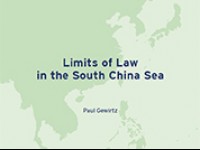
Paul Gewirtz, Potter Stewart Professor of Constitutional Law and Director, the Paul Tsai China Center
Jun 01, 2016
Although a rules-based and law-based approach in the international arena is an admirable aspiration, law will not solve the dangerous problems in the South China Sea. More specifically, the upcoming ruling in the case brought by the Philippines against China before an arbitration tribunal under the U.N. Convention the Law of the Seas will not solve the problems or even make a major headway in resolving them. An examination of the issues before the tribunal and its most likely decisions demonstrate that the tribunal and law can make only a very limited contribution to resolving the South China Sea crisis. Law will not save us from continuing to focus predominantly on negotiations and power politics.
Jun 01, 2016
China is preparing an air defence identification zone (ADIZ) in the South China Sea, two years after it announced a similar one in the East China Sea, according to sources close to the People’s Liberation Army and a defence report.
May 31, 2016
China will "pressure" the United States on maritime issues at key talks in Beijing next week because of Chinese concerns over the increased U.S. military presence in the disputed South China Sea, a major state-run newspaper said on Tuesday.
AP, The Associated Press
May 31, 2016
China on Monday lashed out at criticism from U.S. Defense Secretary Ashton Carter, accusing him of harboring a Cold War mentality and saying Beijing has no interest in "playing a role in a Hollywood movie" of Washington's design.
May 31, 2016
China hopes to get relations with the Philippines back on track, President Xi Jinping has told new Philippine President Rodrigo Duterte, after ties were affecte
Rommel C. Banlaoi, Director, Center for Intelligence and National Security Studies
May 31, 2016
Duterte’s strong performance at the polls seems to demonstrate Filipinos’ approval of a new approach to the South China Sea problem by holding bilateral talks with China and the U.S. But if these talks fail to benefit of the Filipino people, particularly on Filipino fishermen who are greatly affected by sea disputes, Duterte may use the arbitration decision as a second option.
May 27, 2016
China wants deeper military ties with Indonesia and will strengthen cooperation on bilateral and multilateral issues, China's defense minister told his Indonesian counterpart, after a recent diplomatic spat in the South China Sea.
Richard Weitz, Senior Fellow, Hudson Institute
May 27, 2016
The U.S. decision to remove all restrictions on arms sales to Vietnam does not aim to militarize the South China Sea dispute or contain China. Rather, the decision was but the latest move among the great powers to pursue their interests in Southeast Asia, which for the United States focus on discouraging China or anyone else from using military power to pursue a coercive solution to territorial conflicts.
Ben Reynolds, Writer and Foreign Policy Analyst in New York
May 27, 2016
In a recent editorial, the New York Times accuses China of “playing chicken” in the South China Sea, which as Benjamin Reynolds argues, dramatically inflates the threat that China poses to the region and the United States. The critique is not militarism, threatening behavior, or the revision of international norms as such. Rather, the narrative outlined by the Times is the standard hawkish U.S. narrative about China and the South China Sea, which have preceded invasions in Vietnam, Iraq, and bombing in Libya, too.
Tian Shichen, Founder & President, Global Governance Institution
May 27, 2016
With the US picking and choosing what parts of customary international law it embraces, the FON operations are clearly exercises of hegemonic power projection so as to establish a US-dominated maritime legal order beyond a world ocean legal order guaranteed under UNCLOS. As for the FON operations conducted in the South China Sea, they are no more than a tool to carry out the US “Pivot to Asia” strategy.
Back to Top

- China-US Focus builds trust and understanding between the U.S. and China through open dialogue among thought leaders.
- Our Offerings
- Topics
- Videos
- Podcasts
- Columnists
- Research Reports
- Focus Digest
- Stay Connected
-
Thanks for signing up!
- Get the latest stories from China-US Focus weekly.